|
|
|
Sort Order |
|
|
|
Items / Page
|
|
|
|
|
|
|
| Srl | Item |
| 1 |
ID:
128225
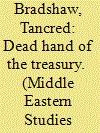

|
|
|
|
|
| Publication |
2014.
|
| Summary/Abstract |
This paper addresses an aspect of British policy in the Trucial States that has received scant scholarly attention. It examines British attempts to promote economic and social development in the Trucial States, and places this policy within the context of British attitudes towards the economic development of the colonial empire. During the 1950s Britain's interest in the Arabian Peninsula expanded, in notable contrast with the rest of the Middle East. One aspect of this expanded role was British efforts to improve the economic and social conditions prior to the discovery of oil in Abu Dhabi in 1958. British officials on the ground were concerned to improve the lot of the population of these impoverished shaikhdoms for a combination of political and strategic and ethical reasons. This article shows that attempts to introduce a modicum of economic and social development in the Trucial States were hindered by the Treasury's refusal to provide adequate funds, and because of inherent problems in finding suitable development projects. Nonetheless, the plans put in place during the 1950s did provide the foundations for subsequent development programmes, which, in turn, drastically expanded as a result of oil wealth.
|
|
|
|
|
|
|
|
|
|
|
|
|
|
|
|
| 2 |
ID:
128243
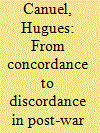

|
|
|
|
|
| Publication |
2013.
|
| Summary/Abstract |
It was a remarkable sight, on this sunny day of 26 August 1944: the patrician figure of Charles de Gaulle leading the victory parade down the Champs-Élysées following the evacuation of the French capital by the German occupier.1 The triumphal march under the acclaims of the Paris citizenry was symbolic of the dominant position the general had assumed in the Gouvernement provisoire de la République française. As provisional head of state and the dominant military figure in France, he was in a position of unprecedented power for a French army officer, at least since Napoleon Bonaparte had proclaimed himself First Consul in 1799. De Gaulle indeed held near-dictatorial powers as he set about rebuilding France at home and restoring control over her colonial empire. Nevertheless, he would resign less than two years later when faced with fierce opposition by established political figures disagreeing with his proposed constitution for a new republic.
Thus created in 1946 through the peaceful transfer of power from a quasi military supremo to a legitimately elected government, only to come to an ignominious end in 1958 under the threat of a military coup during the darkest days of the Algerian War of Independence, the short-lived French Fourth Republic experienced the full spectrum of civil-military relations (CMR). This episode provides a dramatic test case to measure the validity of any given CMR theory as it encompassed such a wide range of well-documented events focused on the very essence of the problematic, explaining civil society's relationship with the military organization established to protect it.2 One such theory seeks to measure a fundamental element of that equation, trying to answer the challenging question of '[w]hy will a military intervene in its own nation's system of government' by outlining the 'conditions [that] promote or inhibit domestic military intervention'.3 Scholar Rebecca Schiff proposed such a model nearly two decades ago, seeking to alleviate the alleged shortcomings of more established theories largely derived from the experience of the United States and often limited to arguments concerned with the separation of civil and military institutions.4
She posited instead that her theory of concordance 'considers the unique historical and cultural experiences of nations' and 'moves beyond institutional analysis by addressing issues relevant to a nation's culture'.5 This paper seeks to measure the validity of such a premise through the study of civil-military relations under the French Fourth Republic. This approach will require the reader initially to understand the evolution of CMR in France through the trauma of military defeat in 1940 and the rise of de Gaulle as well as the circumstances that led to the instauration of the Fourth Republic. It will then become necessary to evaluate the influence of successive challenges overseas, first in Indochina and then in Algeria, to establish the legitimacy of the concordance theory as civil-military relations came to a nadir in France. First, though, one must clearly comprehend the foundations of Schiff's theory in order to adequately judge its validity through the proposed case study.
|
|
|
|
|
|
|
|
|
|
|
|
|
|
|
|
| 3 |
ID:
128185


|
|
|
|
|
| Publication |
2014.
|
| Summary/Abstract |
Etymologically 'diaspora' means any people or ethnic population forced or induced to leave their traditional homelands; being dispersed throughout other parts of the world, and the ensuing developments in their dispersal and culture. Historically, the terms 'diaspora' was initially uses by the ancient Greeks to refer to citizen of grand city who migrated to a conquered land with the purpose of colonization to assimilate the territory into the empire. The original meaning was cut off from the present meaning when the old testament was translated to Greek: the word diaspora was used to refer specifically to the populations of Jews exiled from Judea in 586 B C by the Babylonians, and Jerusalem in 136 AD by the Roman empire.
|
|
|
|
|
|
|
|
|
|
|
|
|
|
|
|
| 4 |
ID:
128190
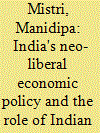

|
|
|
|
|
| Publication |
2014.
|
| Summary/Abstract |
Like other developing countries, India also faced a huge economic crisis during 90s. Basically, over the 80s there was a large and growing fiscal imbalance going on in the Indian economy and from mid 80s, India started facing problems related to balance of payments. Because of the Gulf war, India's export business decreased, oil import bill increased, credit dried up and investors were apprehensive about more investment. All these factors together led to a serious economic crisis during the end of 1990 and the government was close to default, foreign exchange reserves had been reduced and as a result, India had to airlift its gold reserves as a pledge in order to secure desperately needed international financing from international monetary fund (IMF). And, in this context, in order to secure its economy from financial crisis and to attract huge foreign direct investment (FDI), India had taken significant policy shifts in the beginning of the 90s. This new model of economic reforms is known as the neo liberal economic policy of India or LPG (liberalization, privatization and Globalization) model. The main objective of this model was to make the Indian economy as the fastest developing economy in the world which will be able to match up with the biggest economics of the world. Soon after, the government started introducing some new polices which include foreign technology agreements, foreign investment, deregulation, privatization, industrial licensing and abolition of license raj and, following the new liberal polices of India from Indian origin from different parts of the globe and overseas Indians stretched their hands with full of help to overcome this financial crisis in a number of ways. Starting from help in privatization, industrialization and foreign direct investment they have always supported their traditional homeland.
|
|
|
|
|
|
|
|
|
|
|
|
|
|
|
|
| 5 |
ID:
131434
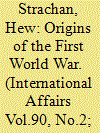

|
|
|
|
|
| Publication |
2014.
|
| Summary/Abstract |
The recent crop of books on the origins of the First World War dispenses with the notion of inevitability in the outbreak of war, and stresses the maturity of European civilization in 1914. They are in danger of prioritizing urban life over rural, civilization and culture over backwardness and superstition. They also say less than they might about the enduring place of war in international relations. The stress on contingency is to be welcomed for getting history away from the determinism of long-term trends, and for reopening the uncertainty of the outcomes still open to the Great Powers in 1914. However, the overall effect is cyclical. The prevailing wisdom on the reasons for war has reverted to the argument that 'Europe slithered over the brink', which dominated from the 1930s until the publications of Fritz Fischer in the 1960s. This does not mean that 'Fischerism', with its belief in German war guilt, is extinct. The challenge which now confronts historians, as they approach a four-year centenary, is to break this circularity and to explore new paths.
|
|
|
|
|
|
|
|
|
|
|
|
|
|
|
|
| 6 |
ID:
131432
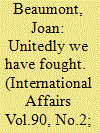

|
|
|
|
|
| Publication |
2014.
|
| Summary/Abstract |
This article examines what motivated the dominions to make such a sustained and costly contribution to the war effort of the British empire during the First World War. With particular reference to Australia, it argues that imperial loyalty, now discounted as anachronistic, was the dominant ideology. Not only did it inspire the initial generous support for the British war effort but, for many Australians, the empire's cause invested with meaning the battle losses which were proportionately the highest of any dominion army. The Gallipoli campaign of 1915 is now celebrated as having given birth to the foundational narrative of the young Australian nation, but at the time this embryonic nationalism too was positioned within the framework of imperial loyalty. Moreover, with the conservative forces dominating federal politics after the divisive debates about conscription in 1916 and 1917, 'loyalty' became entrenched as the litmus test of political reliability. Hence, while Australia's Prime Minister W. M. (Billy) Hughes aggressively asserted the rights of the dominions to a new and more independent role within the imperial relationship in 1918 and 1919, this agenda for change found little support at home. It is therefore ahistorical to see the First World War as the birth of Australian nationalism in the sense that the term is understood today. Rather, imperial loyalty was affirmed by the British victory as the dominant ideology and proved able to accommodate the growing sense of national singularity that the war fuelled.
|
|
|
|
|
|
|
|
|
|
|
|
|
|
|
|
|
|
|
|
|